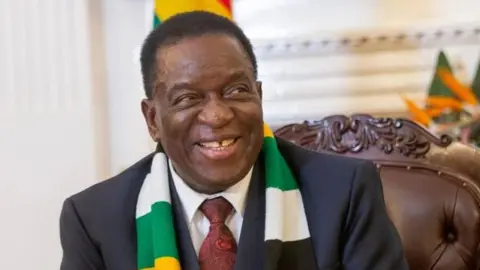Zimbabwe condemns fresh ‘illegal and coercive’ US sanctions
 EPA
EPAZimbabwe's government has condemned fresh sanctions that the US imposed against the country's president and senior officials on Monday.
The US accused President Emmerson Mnangagwa and the others on its list of corruption and human rights abuses.
A spokesperson for President Mnangagwa on Wednesday said the accusations were "defamatory" and a "gratuitous slander" against Zimbabwe's leaders and people.
The new sanctions replaced a broader programme introduced two decades ago.
The deputy chief secretary in President Mnangagwa's communications team George Charamba demanded that the US promptly lift the "illegal coercive measures".
"We condemn these malicious statements as completely uncalled for, defamatory, provocative, and a continuation of wanton hostilities against Zimbabwe by the US government," he said in a statement.
"We demand that the Biden administration provides evidence in support of these gratuitous accusations, failure to which the administration must, without any further delay, withdraw them unconditionally."
Mr Charamba also called on the UN, the African Union and southern African regional bloc Sadc to support Zimbabwe's call for the removal of the sanctions.
Zimbabwe has also been critical of the way the US government lifted the old sanctions programme on Monday, saying that Zimbabweans cannot be expected to be grateful for the measure.
Mr Charamba said that ending the sanctions imposed in the early 2000s "can never atone for, let alone write off, heinous crimes committed against Zimbabwe and her people".
Those sanctions were targeted at then-President Robert Mugabe and dozens of other high-ranking government officials, whom Washington accused of interfering in elections.
Zimbabwe's government has repeatedly blamed the measures for the country's crippling economic problems, including hyperinflation and high poverty levels - this was denied by the US, which noted the sanctions were targeted at individuals and were not a blanket trade blockade as seen in some countries.
The fresh sanctions block assets held by President Mnangagwa and the sanctioned officials in the US and further bar them from unofficial travel there.
Those on the list include First Lady Auxillia Mnangagwa, Vice-President Constantino Chiwenga, Defence Minister Oppah Muchinguri, senior security officials and businesspeople found to have facilitated state corruption.
